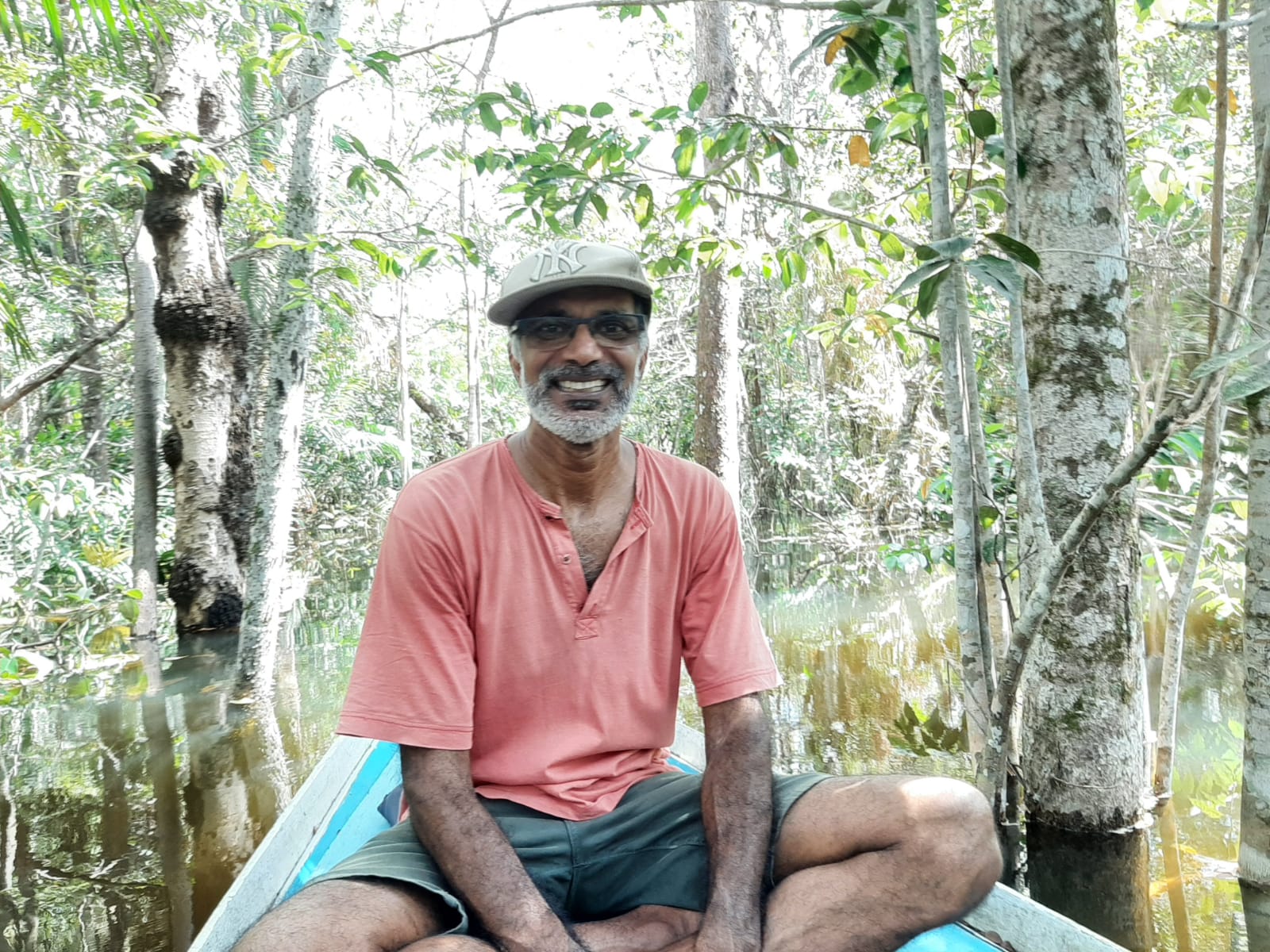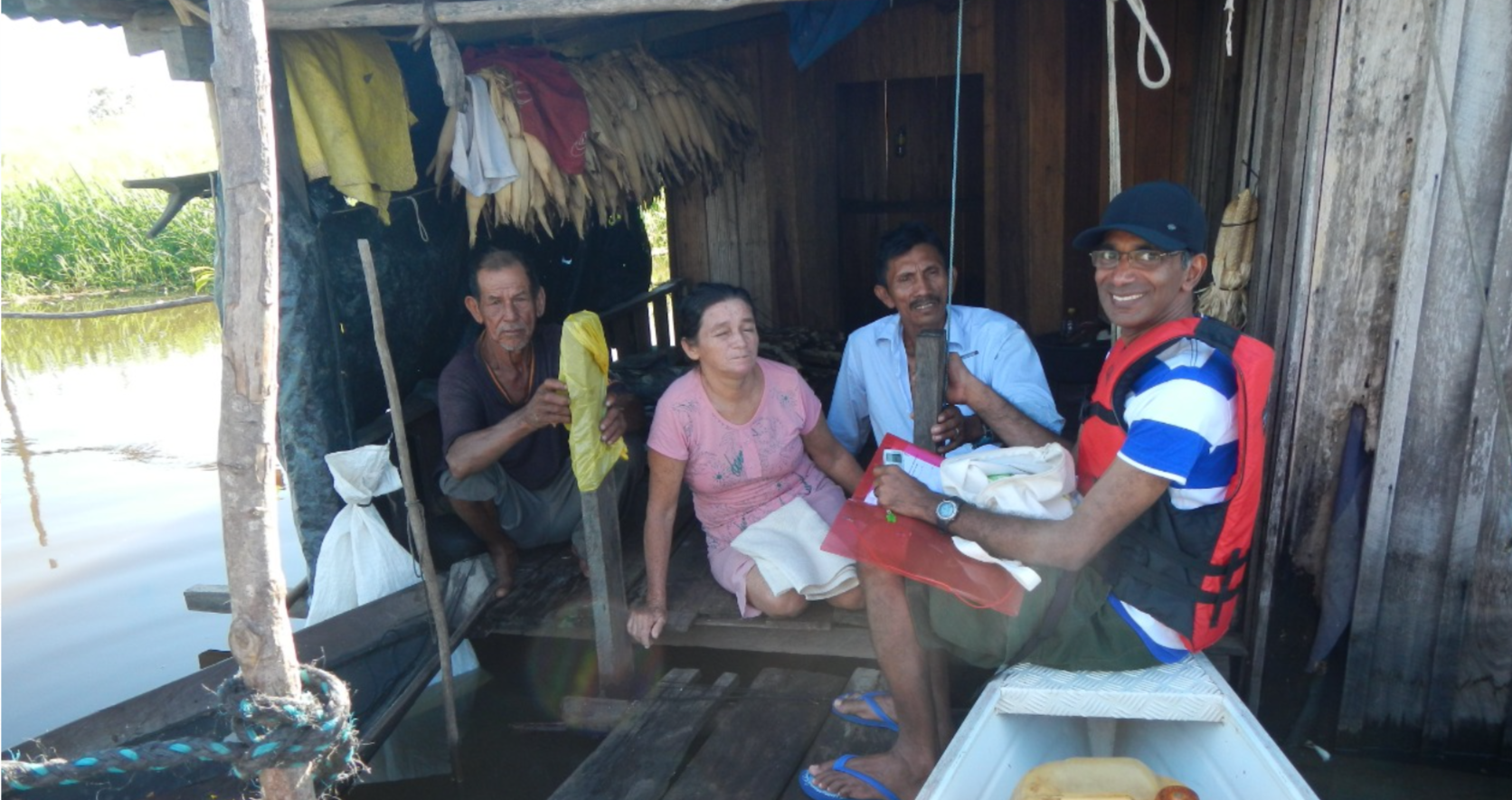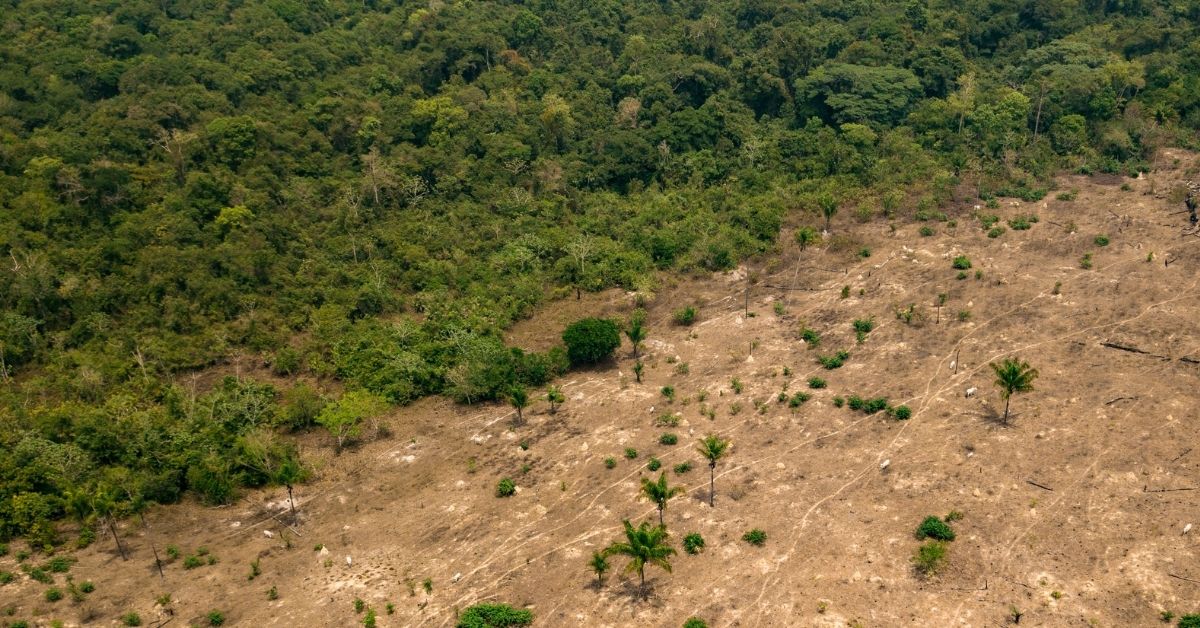Amid the lush Amazon forests in Brazil, young Shaji—still in his mid-twenties then—was working with the Quilombola community. These are descendants of Afro-Brazilian slaves who escaped slave plantations in Brazil by running deep into the forests and settling with the existing tribal communities. This was one of Shaji’s first few assignments for working for the rights of various communities in the Amazon.
Shaji was sent here to understand the community’s culture and way of life. “Before coming here, I’d heard all sorts of things about the tribal communities living in the Amazon forests, about how they kill people among other such things,” he tells The Better India.
What Shaji found instead was love and acceptance when the chief invited him to sit and dine together, and offered the young man the first plate of food — an important part of binding communities. He felt so at home with the group that when it was time to go, he promised them that one day, he would come back here to work with the members again.
This is just one of several tales that Shaji Thomas has to tell. The Kerala-born lawyer has spent over three decades in Brazil, working with various communities in the heart of the Amazon, to ensure their welfare, dignity and rights, alongside the preservation of the ‘lungs of the earth’.

Finding a new home
Shaji belongs to an agricultural family in Ramapuram village in Kerala’s Kottayam district. He says that from when he was a young boy, he knew he wanted to work for the interests of marginalised communities. “I was involved in social movements for the Adivasi community from quite a young age,” says Shaji, whose father was a local politician in the village. “I volunteered with several NGOs across various cities, including Mysore, Indore, Pune and wherever I went to study.”
Shaji had heard a lot about the Amazon forests, and harboured a dream to visit the area some day. In 1989, when he was 23, he finally got the opportunity to realise his dream when he arrived at Sao Paulo for an overseas training programme.
At this time, there were no direct flights from India to Brazil, so Shaji spent a week travelling before he finally arrived. Without the luxuries of cellphones, he sent a fax to the team that was supposed to pick him up. However, the fax never reached Brazil on time, so there was no one to pick him up from the airport.
Shaji spent hours travelling to the university. Almost no one knew English, and he himself did not know a single world of Portuguese or Spanish. “I did not have enough money to reach my destination but the taxi driver was kind enough to take me there anyway,” he says.
When he finally arrived at the university, Shaji was handed a traditional Brazilian alcoholic beverage, which is generally consumed before lunch. Assuming it was lemon juice, he gulped the drink down. “I had not eaten or drank anything for hours. I was so drunk that I just passed out in the room for hours,” Shaji laughs. “When I woke up, I had no idea what had happened. I didn’t drink before, so I was sick.”
It’s safe to say that Shaji’s assimilation with this new country was slow and gradual.
His university in Sao Paulo arranged for him to learn Portuguese. The institute was also involved in several social movements across Brazil, so one of Shaji’s first assignments was to work for the Landless Workers’ Movement, one of the largest social movements in Latin America. “The experience was life changing,” he notes.
The university asked Shaji to study with them, and he pursued a degree in theology. At this time, the liberation theology movement was raging through Brazil. This movement works for the political liberation of oppressed people and to address inequalities such as race or caste. “This helped me integrate myself with marginalised communities there,” he says.
In 1991, Shaji received the opportunity to travel to the Amazon forests. He took three flights to reach Santarem, and then arrived in the village in the forests after a 16-hour boat ride. Here, he met the Quilombola community and learned about their life and culture.
In ’93, when Shaji finally completed his graduation, he returned to the Amazon forests. Thus began his work for various causes — social movements, rights of indigenous people, leader formation, and environment conservation and sustainable development, among others.
Amid violence, death threats, and gunshots
“I was working with 64 communities, and they are all settled in extremely far-flung and remote areas deep in the heart of the forests,” Shaji says. He spent six years living all alone on a boat in the Amazon River. “One couldn’t travel at night in the river. We had no navigation tools like GPS. I travelled thousands of kilometres on that boat. I’d fill around 2,500 litres of diesel for my boat, return to Santarem to refuel, and then be on my way again. My food would mainly be the fish from the Amazon River.”
This continued till 2006, when Shaji started studying law. “Legal rights are the most integral for these people. The only way to give them a better life is to bring about legal changes. If they don’t have legal aid, they won’t be able to fight for their rights. So I decided to pursue law.”
Somewhere around this time, he decided to apply for Brazilian citizenship. He explains, “Land, mining, drugs, or wood mafia — all of these groups cause big problems for indigenous communities here. When I would try to intervene, I was told that I had no right because I was a foreigner. So I took on Brazilian citizenship to let them know that I am, in fact, a Brazilian, and that I care for the rights of the people.”
Shaji notes that there are many threats to his life at all points. “Many have tried to kill me. They have shot machine guns at my boat to try and sink it. I used to have to keep guns with me for protection, because I was all alone on the boat,” he says. Shaji also worked alongside Dorothy Stang, an activist working for the welfare of tribal communities in the Amazon, who was shot by the forest mafia.
“Problems related to land are massive in Brazil,” Shaji explains. “The Amazons form a major part of Brazil and are home to millions. But the real problem is that the forests are controlled or owned by a few people, mainly the rich, who control almost half the wealth in Brazil. So Amazon’s habitants have a large amount of land, but no legal rights.”

In 1988, the Brazilian constitution included in its ambit that land rights be given back to the indigineous population. “My first step is to make these people aware of these rights. I take them to the capital city, prepare their legal orders and help them fight their cases,” he notes.
Up until 2002, Brazil had a centre-leaning government, so Shaji’s work had no real support. However, when Luiz Inácio Lula da Silva came to power in 2002, things turned around slightly, Shaji says. “He was the leader of the Workers’ Party, and so we saw a lot of reforms and changes in Brazil’s social sector,” he adds.
However, subsequent government changes have since resulted in many social rights being taken away. “There are no measures to control land grabbing and illegal projects on indigenous lands, particularly in the recent government’s regime,” Shaji says. “Because of several hydroelectric projects, some parts of the region are sinking. The Amazon’s massive biodiversity — the largest in the world — is going underwater.”
A majority of the Amazon forests are located in Brazil. According to Time Magazine, with the current rate of deforestation, 27 per cent of the forests will be gone by 2030. The same report suggests that 2,62,829 square kilometers of the forest were deforested between 1985 and 2004. Mongabay states that last year, the Brazilian Amazon saw as many as 2,500 major fires between late May and early November. Meanwhile, a Guardian report from last week states that the Amazon is now emitting more CO2 than it is able to absorb.

Shaji says that many of his fellow lawyer friends and social workers have been killed while fighting to protect the Amazon forests. “Even I have to keep moving from one city to another because of the threats associated with the work I do,” he laments. “We have no support.”
Shaji is married to Ely, a Brazilian woman from a small farming village in the country, who is also a social worker. Ely completed her graduation from Kerala University and is working on a project to preserve Mangrove forests, a collaboration between India and Brazil. She is also a lawyer and the two work together to protect the Amazon forests. Ely is the first person from her village to graduate.
Amid COVID, with the sufferings of people having increased, so has the violence and unrest. “There are no jobs, a lot of robberies, killings and other crimes just to survive. The government has also changed the gun laws, which has made it easier to procure arms. But Ely and I work for the people regardless,” Shaji says.
He just finished coordinating a project on the ‘influence of climate change on small-scale agriculture’ in Peru, Colombia, Ecuador and Brazil. He is also working on a project aimed at the upliftment of women in the Amazon region, as well as continuously providing legal assistance to around 60 communities of the area. Right now, they are working on a case against the land mafia.
Shaji and his wife frequent India every few years. “A few years ago, I organised the World Social Forum in New Delhi. I met with a lot of people from across the development sector in India, lived with them for the duration of the forum, and formed beautiful connections. I still visit them whenever I come back. My wife and I recently visited Kerala Agricultural University to conduct a few classes while she was studying there. I maintain a lot of connection with my home country — both academic and personal.”
Encapsulating his 32-year experience in protecting the Amazon region, Shaji says, “I am just a human being that wants to see a better world. It’s devastating to see the state of the forests today. Every day, when I look outside, I see 20-30 football fields’ worth of forest area on fire. You can see the smoke emanating from here. You can also see the consequences of humanity’s actions — rainfall patterns are changing, the climate change crisis is becoming more severe, the heat is rising. It is the world’s responsibility to protect the Amazon forests. We have to stop ourselves from heading towards our own destruction.”
Edited by Yoshita Rao
No comments:
Post a Comment